In October of 2016, the California State University Long Beach Research Foundation was awarded FHWA Grant #DTHF6116H00030, the $1.25M Transportation Workforce Strategic Initiative, on behalf of the National Network for the Transportation Workforce (NNTW). The NNTW is a university-based collaborative of regional transportation workforce centers that provide research and strategic partnerships for FHWA’s Office of Innovative Program Delivery.
Over the course of its two-year lifespan, this strategic initiative sought to establish a set of five transportation discipline-focused career pathways that could be deployed within post-secondary education/training institutions nationwide, in order to begin the development of forward-looking, technology-infused workforce pipelines that would lead students and job seekers into critical occupations within the highway transportation sector.
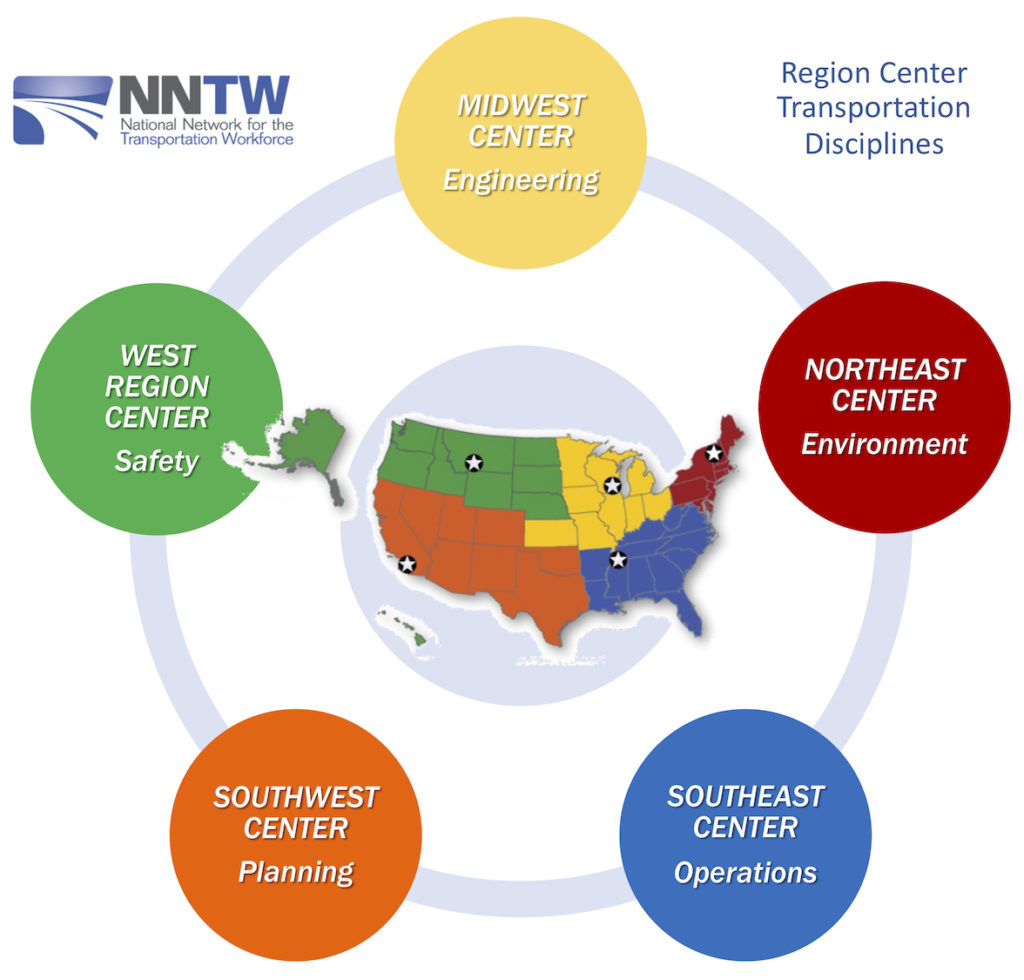 To accommodate this enormous research effort, each NNTW Regional Center was assigned one of the five disciplinary focuses specified by the initiative (see below). In January of 2016, the strategic initiative was renamed the National Transportation Career Pathways Initiative (NTCPI) to better represent its primary objective.
To accommodate this enormous research effort, each NNTW Regional Center was assigned one of the five disciplinary focuses specified by the initiative (see below). In January of 2016, the strategic initiative was renamed the National Transportation Career Pathways Initiative (NTCPI) to better represent its primary objective.
In its execution of this research effort, an abiding goal for the NNTW has been to develop a multidisciplinary roster of transportation career pathways and related implementation plans that best support FHWA’s strategic goal of “keeping the nation’s highway system safe, reliable, effective, and sustainably mobile for all users.” Each of its Regional Centers worked collaboratively with leaders from transportation, education, and workforce development to establish a body of research that challenges traditional approaches to job classification, occupational forecasting, and career pathway development.
An analysis of the NNTW’s first-year research, which characterizes the state of the highway transportation workforce, can be downloaded here in its various forms: First Year Research Report; First Year Research Presentation; Cross-Disciplinary Workforce Findings.
In January of 2019, the NNTW presented both its research findings and plans for career pathway deployment to FHWA at its headquarters in Washington, DC, followed by a comprehensive project report in March of 2019. A copy of this report, which focuses on the design and implementation of focused career pathway initiatives for each transportation discipline, can be downloaded here, along with the FHWA presentation.
A brief description of the role each Regional Center played in the deployment of this workforce initiative, along with links to their final research reports and pathway implementation plans, is provided below.
SOUTHWEST TRANSPORTATION WORKFORCE CENTER (SWTWC)
 Housed at the California State University at Long Beach, the SWTWC Regional Center acted as the initiative’s programmatic lead while also researching and evaluating the “Transportation Planning” workforce discipline of NTCPI.
Housed at the California State University at Long Beach, the SWTWC Regional Center acted as the initiative’s programmatic lead while also researching and evaluating the “Transportation Planning” workforce discipline of NTCPI.
Transportation planning is a crucial specialization within the planning profession, characterized as “the discipline that examines and evaluates the potential of future actions to improve movement of people and goods by motor vehicle, public transportation, walking and cycling in accordance with a set of objectives.”
Transportation planners provide cooperative interaction between different community stakeholders and decision makers as they address the broad concerns of mobility, safety, environmentalism, and social equity.
Throughout the project, SWTWC worked to clarify the role of the transportation planner—as found in both public and private-sector employment—and the workplace competencies that are considered critical to the effective execution of the transportation planning function.
The SWTWC team detailed its workforce findings in a comprehensive Career Pathway Report which includes plans for deploying a “Transportation Planning Professional Plus” certificate program.
SOUTHEAST TRANSPORTATION WORKFORCE CENTER (SETWC)
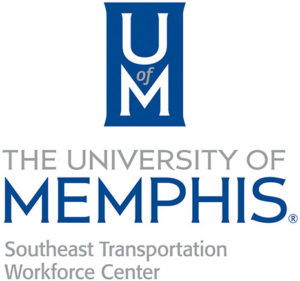 Housed at the University of Memphis in Tennessee, the SETWC Regional Center researched and evaluated the “Transportation Operations” workforce discipline. The transportation operations workforce is characterized by a diverse set of occupations supporting the safe, reliable, and efficient movement of people and goods. Central to their mission is the integration of transformative technologies to improve operational outcomes, and the necessity of a systems approach.
Housed at the University of Memphis in Tennessee, the SETWC Regional Center researched and evaluated the “Transportation Operations” workforce discipline. The transportation operations workforce is characterized by a diverse set of occupations supporting the safe, reliable, and efficient movement of people and goods. Central to their mission is the integration of transformative technologies to improve operational outcomes, and the necessity of a systems approach.
Transportation operations includes not only the Transportation Systems Management & Operations (TSMO) aspect of public sector traffic operations, but also similar roles in both transit and freight realms. SETWC approached transportation operations in a way that addresses occupations within the three realms of traffic, transit, and freight.
The SETWC team detailed its workforce findings in a comprehensive Career Pathway Report which includes plans for “Attracting Next-Generation Transportation Operations Professionals.”
NORTHEAST TRANSPORTATION WORKFORCE CENTER (NETWC)
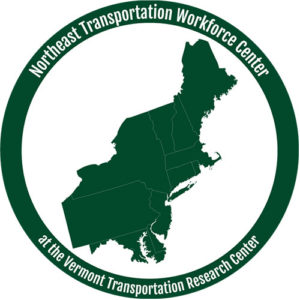 Housed at the University of Vermont at Burlington, the NETWC Regional Center researched and evaluated the “Transportation Environment” workforce discipline of NTCPI. The environmental workforce in transportation emerges from highly inter-disciplinary knowledge sets, skills and backgrounds to take on a wide range of responsibilities and functions.
Housed at the University of Vermont at Burlington, the NETWC Regional Center researched and evaluated the “Transportation Environment” workforce discipline of NTCPI. The environmental workforce in transportation emerges from highly inter-disciplinary knowledge sets, skills and backgrounds to take on a wide range of responsibilities and functions.
Workers tend to hold singular positions in transportation agencies or organizations covering these fields and are often scattered across multiple divisions, from air quality to planning to materials to roadside biology.
These positions are important for organizations to meet their environmental mandates and missions, however there is no way to reliably document the number of workers currently employed in this transportation sector using available data; a differentiation from roles and occupations in other sectors.
The NETWC team detailed its workforce findings in a comprehensive Career Pathway Report which includes plans for “Advancing Future Environmental Workers in Transportation.”
MIDWEST TRANSPORTATION WORKFORCE CENTER (MTWC)
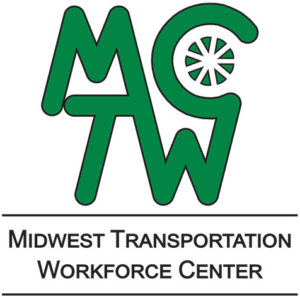 Housed at the University of Wisconsin at Madison, the MTWC Regional Center researched and evaluated the “Transportation Engineering” discipline, with a particular focus on the highway maintenance workforce.
Housed at the University of Wisconsin at Madison, the MTWC Regional Center researched and evaluated the “Transportation Engineering” discipline, with a particular focus on the highway maintenance workforce.
In the 1960s, 70s, and early 80s, transportation agencies focused on building and expanding the interstate highway system. Since the mid-1980s and 90s, there has been a gradual shift towards preserving and operating the significant highway and bridge infrastructure built through that earlier investment.
Challenges like extreme weather events, reduced funding, and increased concern over environmental impacts present complex effects on the competencies needed from highway maintenance workers to keep the nation’s highways in good repair.
The MTWC team detailed its workforce findings in a comprehensive Career Pathway Report which includes plans for “Advancing Apprenticeships in Highway Maintenance Engineering.”
WEST REGION TRANSPORTATION WORKFORCE CENTER (WRTWC)
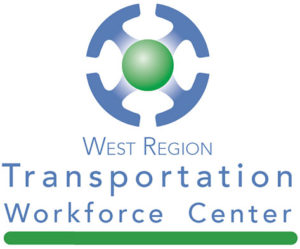 Housed at the Montana State University at Bozeman, the WRTWC Regional Center researched and evaluated the “Transportation Safety” workforce discipline of NTCPI. The goal of road safety is for all transportation system users to travel freely without risk of harm or death.
Housed at the Montana State University at Bozeman, the WRTWC Regional Center researched and evaluated the “Transportation Safety” workforce discipline of NTCPI. The goal of road safety is for all transportation system users to travel freely without risk of harm or death.
Road safety professionals, therefore, must understand the complex interactions between system components—vehicles, system users, infrastructure—and utilize and develop analytical tools and techniques to minimize system risk.
The WRTWC team detailed its workforce findings in a comprehensive Career Pathway Report which includes plans for deploying a “Career Pathways to Safer Transportation Systems” program.
LEARN MORE ABOUT NTCPI
With its multidisciplinary specialists, stakeholders from across the country, and extensive labor market analysis, the NNTW team was uniquely positioned to carry out the goals of this pathway initiative, and deployment of the five proposed career pathway implementations will help prepare future transportation professionals to develop the industry competencies necessary to address transportation workforce challenges throughout the nation.
For direct inquiries regarding this important initiative, its research outcomes and implementation strategies, contact NTCPI Project Coordinator Scott Jakovich at scott.jakovich@csulb.edu.
To learn more about the NNTW projects, initiatives, and partnerships that are working together to address the growing demands of the nation’s transportation workforce, click here to receive regular updates.